

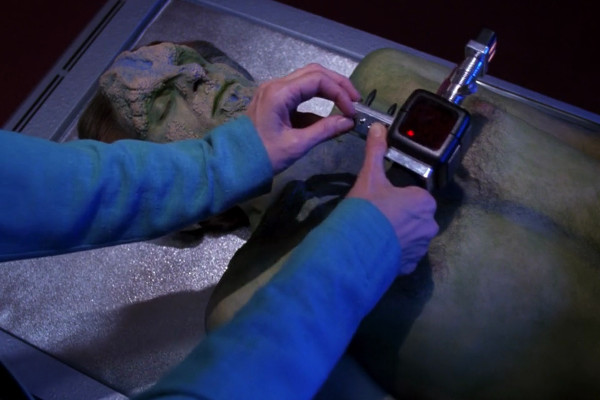
Ship doctor Beverly Crusher suddenly becomes a test officer for scientific research, a left-field development that sees her turn into Ms. Columbo for a murder investigation. With most of the episode told via flashback, it ends with the villain of the week deciding not to shoot Crusher, but instead deliver a long monologue explaining all his plans. It's a completely inessential episode, never quite believable, yet what perhaps rewards is that it's one of the few episodes this season to use a "cold opening" in its purest sense, whereby the story is already underway as we see the pre-credits teaser. Although all teasers are technically "cold openings", it seems inappropriate to use the term for most of The Next Generation, which often have rambling teasers that fail to go anywhere before the opening credits put the viewers out of their misery.
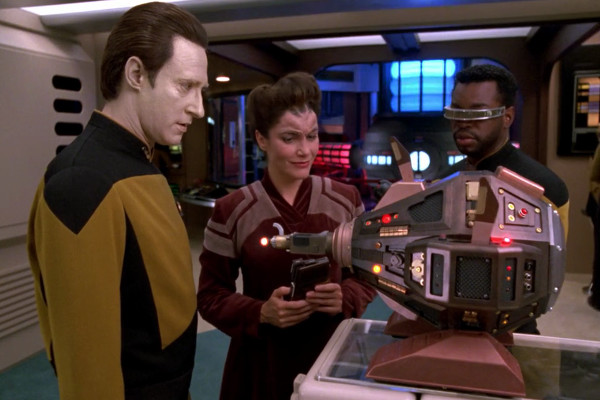
A few of the cast had a go at directing, a role in which Jonathan Frakes was the most successful. He directed eight Next Generation episodes (including this one, and The Chase), as well as a couple of the movies, some DS9/Voyager and TV series including NCIS: Los Angeles and The Librarians. Okay, maybe the less said about the 2004 Thunderbirds movie the better, but he developed a fairly extensive resume in the field. (For completeness' sake, then the other main cast members who tried their hand at directing were Patrick Stewart, Levar Burton, Michael Dorn and Gates McFadden. Of the four, only Dorn didn't direct a Next Gen episode).
This particular episode perhaps doesn't make full use of Frakes' abilities, as it involves flying plastic boxes known as "Exocomps", which Data believes are sentient lifeforms, and risks Picard and Geordi's lives to protect. Afterwards, Data explains to Picard why he was prepared to risk letting him possibly die in favour of a sentient George Foreman grill, causing the Captain to tell Data "it was the most human decision you've ever made". And not, as you might expect, giving him a punch in the dick. In discussing machine sentience, their creator, Doctor Farallon (Ellen Bry) states that "there is a big difference between Data and a tool", which is an odd thing to say, as that's exactly what he acts like all episode.
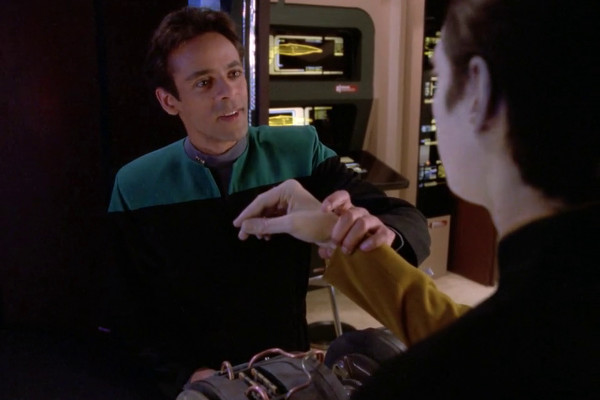
Perhaps the biggest event during the sixth season was the launching of a third Star Trek series, with Deep Space Nine making its debut between Chain of Command, Part II and Ship In a Bottle. Although much liked here at The Anorak Zone, DS9 was still taking its uncertain first steps at this point, and took, like TNG, two or three seasons to really enter its groove. However, a clear example of how wilfully bland The Next Generation can be is gleaned here from a crossover between the two series. Several characters go over to the dark, squalid and dramatic space station... and talk about pasta, plasma coils and aquaduct venting systems. This is a crew that could go back in time to the Normandy Beach D-Day landings for a discussion on embroidery. Perhaps even more telling is that DS9's Dr. Julian Bashir gets to visit the Enterprise in turn. Arguably the least dramatically compelling and rounded of the DS9 cast, when taken out of context and placed within the somewhat sterile TNG line-up, the guy's a charismatic bubble of spunk.
The actual storylines of this dreary two-parter include Data and Worf finding out more about their backgrounds. Worf is angry with his father for being captured instead of killed, which is against Klingon honour. Enraged, Worf explains this to his father... after he's been captured. The Klingon wasn't the brightest of characters, and so the irony of this is perhaps lost on him even when he's captured a second time. It ends with a woeful song and lines like "is it so hard to speak of love?", before Worf gets back on board the Enterprise and lies to Picard, telling him his father was killed. "I understand," says Picard, allowing Worf to save his pride, and not, as you might expect, giving him a court martial for lying about a mission to his commanding officer.
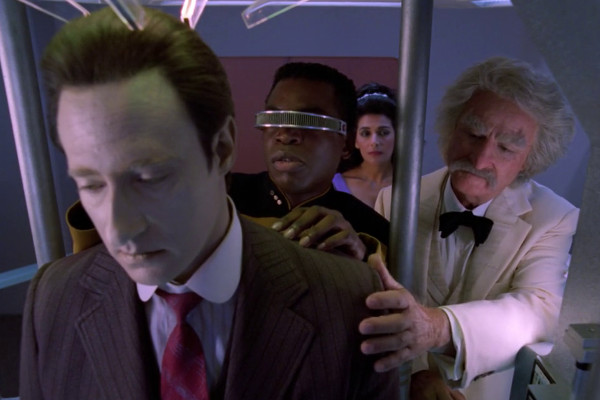
A fairly bland conclusion to a two-part story that ended season five. As a mid-season filler this may have been passable, but as a cliffhanger way to bridge seasons (a tradition since the very popular season three closer The Best of Both Worlds), it lacks true dramatic weight. It might also be argued that it lacks enough story for a two-parter, and would have been better as a 45 minute tale.
Perhaps the worst element is the normally-reliable Jerry Hardin, here uncustomarily hammy and over the top as Mark Twain. For Twain, the actor adopts a very nasal, piercing speech pattern, which - while Twain's voice was never recorded - friends have gone on record giving an impression of his voice, with much more laboured, deeper speech patterns. While this may sound like a small, almost pedantic element to isolate for criticism, the "fingernails down a blackboard" voice Hardin uses for Twain may induce migraines...
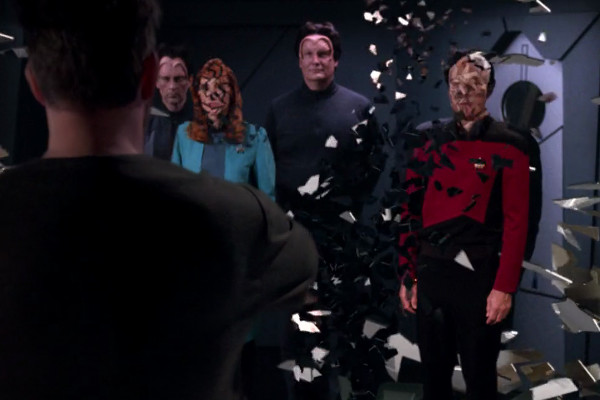
A reasonably engrossing episode, whereby Riker keeps getting hallucinations that he's really a killer and that the entire Enterprise is just in his imagination. It's a fairly standard SF trope, not even new to this show, but it's diverting enough. However, it's always clear Riker will prevail at the end, so the danger is very artificial... an element that may have worked better with a more dynamic actor in this lead role, or with aliens that looked less silly. The subject matter of Riker attempting to be an actor could be taken as a meta commentary on the series, if you're of a very cruel state of mind...
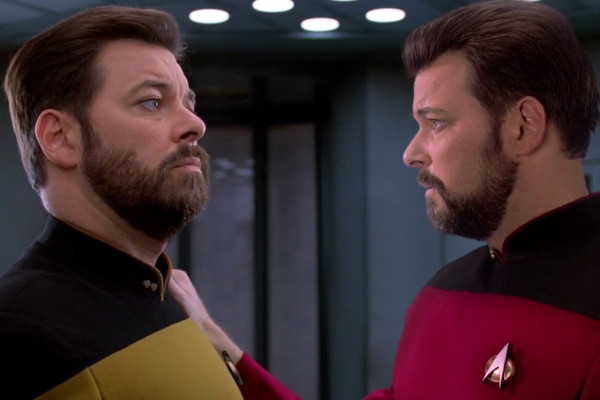
LeVar Burton's first job as a director wasn't an easy task, with multiple splitscreen/CGI overlays as Commander Riker makes the unlikely discovery of copy of himself made via a faulty transporter beam. For the past eight years they've lived unknowing, separate lives, with the other Riker struggling to survive, isolated... yet still managing to put on weight and grow a beard like the regular one.
It's a schlocky concept, even for Next Gen, but it kind of gets by as the other Riker realises all that he's lost, and awakens submerged feelings of romantic involvement with Troi. Sadly, the two don't really possess the full acting gravitas to make it come off successfully and, worse, they have next to no sexual chemistry onscreen. Often with Next Generation episodes, it feels as if you're watching the cast as themselves, "playing" at being their characters, rather than embodying them, not helped by all the little in-jokes the cast play with each other onscreen. That's prevalent here, though there's a fun vibe to the episode that causes it to rank fairly highly.